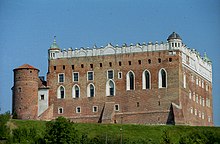Gollub War
| Gollub War | |||||||
|---|---|---|---|---|---|---|---|
| Part of the Polish–Teutonic War | |||||||
 Golub Castle |
|||||||
|
|||||||
| Belligerents | |||||||
|
|
|
||||||
The Gollub War was a two-month war of the Teutonic Knights against the Kingdom of Poland and the Grand Duchy of Lithuania in 1422. It ended by signing the Treaty of Melno, which resolved territorial disputes between the Knights and Lithuania over Samogitia that had dragged on since 1398.
The First Peace of Thorn of 1411 had ostensibly ended conflicts between the warring powers of the Polish-Lithuanian–Teutonic War, although the border between Samogita and Prussia was not determined. Poland also contested Pomerania, Pomerelia, and Culmerland (Chełmno Land). When numerous attempts at negotiations failed, a brief Hunger War broke out in summer 1414. Since Poles and Lithuanians were unable to capture strongly fortified Ordensburgen of the Knights, parties agreed to mediate their dispute in the Council of Constance. The Council established the Samogitian Diocese in Varniai and appointed Matthias of Trakai as its first bishop. However, it did not solve the underlying territorial disputes by the time it ended in 1418.
A new, but futile, round of negotiations started in May 1419 in Gniewków with papal legate Bartholomew Capri, archbishop of Milan, as mediator. The dispute was then passed to Sigismund, Holy Roman Emperor for further mediation. On January 6, 1420 in Wrocław the emperor delivered his decision that Peace of Thorn was valid and fair. That meant that Samogitia belonged to Lithuania only for the lifetime of Vytautas the Great, Grand Duke of Lithuania, and Jogaila, King of Poland. After their deaths Samogitia was to return to the Teutonic Knights. Other territorial claims were also rejected. The emperor granted the Knights even more rights than they demanded in negotiations. This decision was probably influenced by the fact that Sigismund hoped to receive support from the Teutonic Knights in his war with the Hussites, who were supported by Vytautas. Vytautas and Jogaila categorically refused to accept this decision. Jogaila unsuccessfully appealed to the Pope Martin V.
...
Wikipedia
